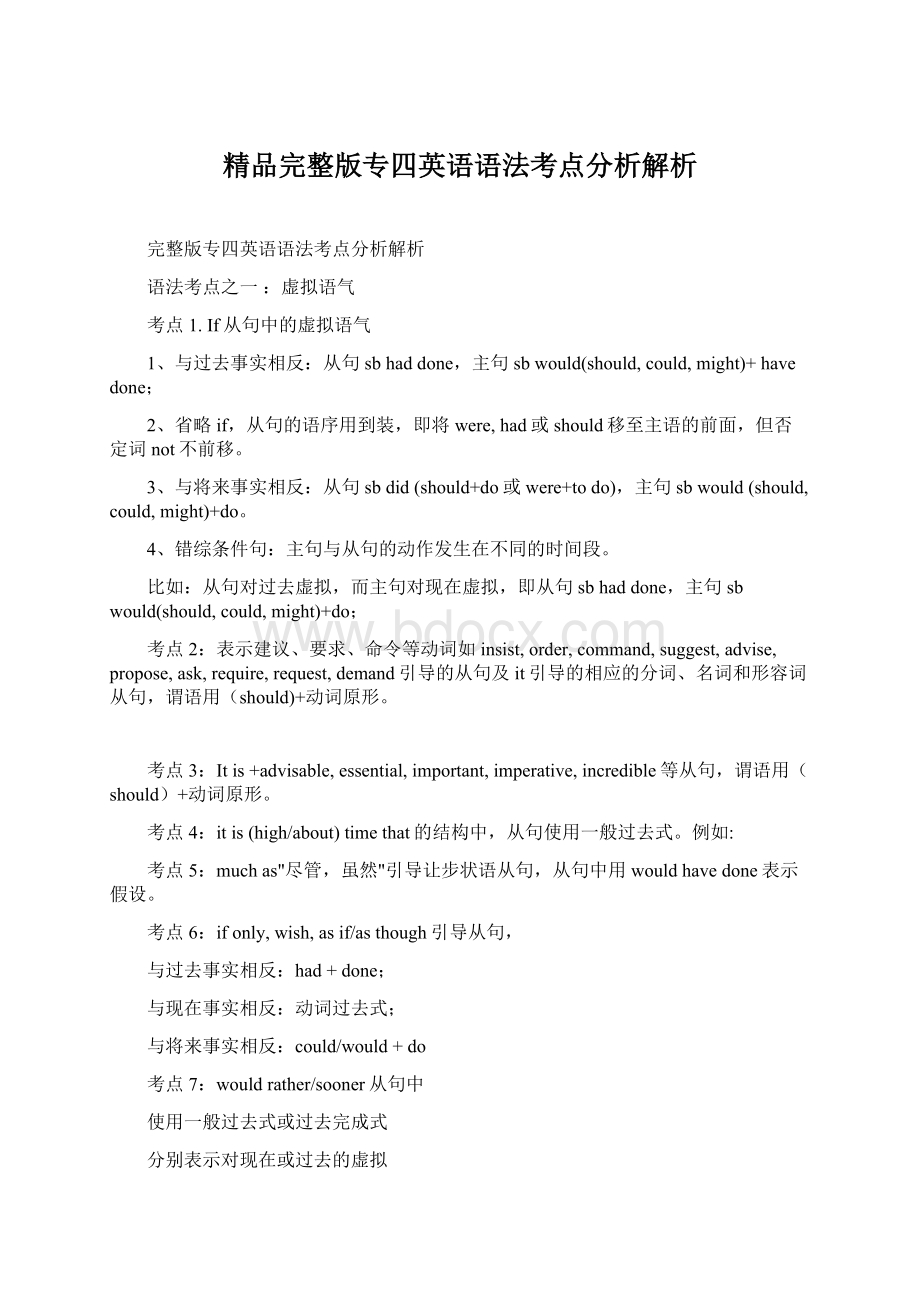精品完整版专四英语语法考点分析解析.docx
《精品完整版专四英语语法考点分析解析.docx》由会员分享,可在线阅读,更多相关《精品完整版专四英语语法考点分析解析.docx(20页珍藏版)》请在冰豆网上搜索。

精品完整版专四英语语法考点分析解析
完整版专四英语语法考点分析解析
语法考点之一:
虚拟语气
考点1.If从句中的虚拟语气
1、与过去事实相反:
从句sbhaddone,主句sbwould(should,could,might)+havedone;
2、省略if,从句的语序用到装,即将were,had或should移至主语的前面,但否定词not不前移。
3、与将来事实相反:
从句sbdid(should+do或were+todo),主句sbwould(should,could,might)+do。
4、错综条件句:
主句与从句的动作发生在不同的时间段。
比如:
从句对过去虚拟,而主句对现在虚拟,即从句sbhaddone,主句sbwould(should,could,might)+do;
考点2:
表示建议、要求、命令等动词如insist,order,command,suggest,advise,propose,ask,require,request,demand引导的从句及it引导的相应的分词、名词和形容词从句,谓语用(should)+动词原形。
考点3:
Itis+advisable,essential,important,imperative,incredible等从句,谓语用(should)+动词原形。
考点4:
itis(high/about)timethat的结构中,从句使用一般过去式。
例如:
考点5:
muchas"尽管,虽然"引导让步状语从句,从句中用wouldhavedone表示假设。
考点6:
ifonly,wish,asif/asthough引导从句,
与过去事实相反:
had+done;
与现在事实相反:
动词过去式;
与将来事实相反:
could/would+do
考点7:
wouldrather/sooner从句中
使用一般过去式或过去完成式
分别表示对现在或过去的虚拟
考点8:
lest/forfearthat+(should)+原形动词。
语法考点之二:
情态动词
*情态动词:
will(愿意),shall(将),must(必须),can,may,would,should(应该),might,could,oughtto,usedto(过去常常),need(需要),dare(竟敢),haveto(不得不)
考试中,情态动词部分重点测试以下内容:
(1)情态动词+行为动词完成式(表示推测)
(2)某些情态动词的特殊用法
考点1.情态动词+have+过去分词结构表示推测
(1)musthavedone表示推测过去某事“一定”发生了。
否定形式为:
can’t/couldn’thavev-ed,表示过去不可能发生某事。
(2)couldhavedone表示推测过去某动作“很可能”发生了。
(3)may/mighthavedone表示推测过去某事“也许”发生了.
(4)oughtto/shouldhavedone和oughtnotto/shouldn’thavedone用于对已发生的情况表示“责备”、“不满”,分别表示“本应该…”和“本不应该…”
(5)needn’thavedone表示过去做了某事,但没有做的必要,意为“本没必要…”。
*didnotneedtodo动作并没发生。
考点2.特殊用法
(1)should表示惊讶
1.Iamsurprised__thiscityisadullplacetolivein.2006
A.thatyoushouldthinkB.bywhatyouarethinking
C.thatyouwouldthinkD.withwhatyouwerethinking
(2)Can’tbut+V.,表示不得不,与haveto同义。
Can’thelp+Ving忍不住。
(3)cannot…too/enough表示“无论怎么……也不算过分”、“越……越好”
(4)may/mightaswell+动词原形”意为“最好,满可以,倒不如”,相当于hadbetter
(5)maywell+动词原形”,意为“(完全)能,很可能”
(6)mayaswellas还是…好了
语法考点之三:
非谓语动词
考点1:
不定式
(1)考察哪些动词接不定式;
(2)考察哪些短语接不带to的不定式;
Hadbetter/hadbest
Wouldrather/wouldrather…than/ratherthan/wouldsooner/wouldsooner…than
Cannotbut/cannothelpbut/donothingbut/donothingbesides/donothingthan
Why引导的疑问句
(3)考察动词不定时的时态和语态:
进行式tobedoing,
完成式tohavedone;
一般式被动语态tobedone;
完成式被动语态tohavebeendone。
另外,不定式短语有将来时的意思;
考点2:
动名词
(1)常接动名词做宾语的词:
mind(介意),miss(逃过),mention(提及),prevent,postpone,practice,risk(冒险),resist(抵制),consider(考虑),admit(承认),avoid(避免),appreciate(感激),fancy(幻想),finish(完成),feellike(喜欢),escape(逃脱),ensure(确保),delay(延迟),deny(否认),resent,detest,imagine(想象),suggest(建议)
(2)介词后的ing:
prevent/stop/keepsb/sthfromdoing阻止…做…
spend/wastetime/moneyindoing在做…方面花钱、浪费时间或金钱;
how/whataboutdoingsth做…怎么样了?
Havesomedifficulty/troubleindoing在…方面有些困难;
Thereisnosenseindoing(做…是没有理由的)
Thank/admire/praise/blame/scold/punishsbfordoingsth因做某事而感谢、羡慕、表扬、责备、惩罚某人
(3)接动名词做介词to的宾语:
applyoneselfto致力于;beaccustomedto习惯于;confessto供认;cometo谈到;devoteoneselfto献身于;getdownto着手做;givewayto对…让步;leadto导致;lookforwardto期待;nextto几乎;objectto反对;payattentionto注意;stickto坚持;standupto勇敢面对;turnto求助于;beusedto习惯于
考点3:
分词
(1)从语态上看,
现在分词一般表主动,
过去分词一般表被动;
(2)从时态上看,
现在分词表示进行,
过去分词表示过去。
如果分词动作发生在句子谓语动词动作之前,分词用完成时。
(3)现在分词的否定形式是not放在分词之前。
*非谓语动词解题三步曲:
一、首先确定主句;
二、分析主动被动;
三、分析动作先后
1._____shouldnotbecomeaseriousdisadvantageinlifeandwork.2010
A.TobenottallB.NotbeingtallC.BeingnottallD.Nottobetall
2."Themanpreparingthedocumentsisthefirm'slawyer"hasallthefollowingpossiblemeaningsEXCEPT.2009
A.themanwhohaspreparedthedocuments...
B.themanwhohasbeenpreparingthedocuments...
C.themanwhoispreparingthedocuments...
D.themanwhowillpreparethedocuments...
3.______atinthisway,thesituationdoesnotseemsodesperate.2000
A.LookingB.looked
C.BeinglookedD.tolook
4.Ifnot____withtherespecthefeelsduetohim,Jackgetsveryill-temperedandgrumblesallthetime.2004
A.beingtreatedB.treatedC.betreatedD.havingbeentreated
5.______,hecannowonlywatchitonTVathome.1998
A.Obtainingnotaticketforthematch
B.Notobtainingaticketforthematch
C.Nothavingobtainedaticketforthematch
D.Notobtainedaticketforthematch
6.Hewasn’taskedtotakeonthechairmanshipofthesociety,______insufficientlypoplarwithallmembers.1996
A.havingconsideredB.wasconsidered
C.wasbeingconsideredD.beingconsidered
7.Henoticedthehelicopterhoveringoverthefield.Thentohisastonishment,hesawaropeladder______outandthreemenclimbingdownit.1995
A.throwingB.beingthrownC.havingthrownD.havingbeenthrown
8.Thismissileisdesignedsothatonce_____nothingcanbedonetoretrieveit.1995
A.firedB.beingfired
C.theyfiredD.havingfired
考点4:
独立主格
(句中没有连接词,
逗号分开两个句子,
存在两个主语。
形式:
名词/代词+分词)。
(1)分词短语作状语时,有自己独立的逻辑上的“主语”,相当于各种形式的状语,表示一种伴随的动作、情况或表原因
(2)介词(with)+名词+形容词/副词+分词,表示伴随行动做或补充说明
1.Agricultureisthecountry’schiefsourceofwealth,wheat______byfarthebiggestcerealcrop.2003
A.isB.beenC.beD.being
2.Time______,thecelebrationwillbeheldasscheduled.2003
A.permitB.permitting
C.permittedD.permits
3.There____nothingmorefordiscussion,themeetingcametoanendhalfanhourearlier.2000
A.tobeB.tohavebeen
C.beingD.be
4._____nocauseforalarm,theoldmanwentbacktohisbedroom.1996
A.TherewasB.Since
C.BeingD.Therebeing
5.Thecountry’schiefexportsarecoal,carsandcottongoods,cars______themostimportantofthese.1994
A.havebeenB.are
C.beingD.arebeing
6.Thetaperecorder___outoforder,thestudentsdidnotknowwhattodo.1990
A.wasB.Being
C.hasbeenD.wasbeing
语法考点之四:
定语从句
关系代词:
which(指sth作主语或宾语),that(指sb或sth作主语或宾语),who(指sb作主语或宾语),whom(指sb作宾语),whose(指sb或sth,作定语),as(指sb,sth作主语或宾语);
做宾语的时候,关系代词可以省略。
关系副词:
when(指时间onwhich),where(指地点atwhich),why(指原因forwhich)
考点1.先行词为人时引导词who和that
(1)只能用who不用that:
1)当先行词为one(s),anyone,those时;
2)当先行词为人称代词时。
(2)只能用that不用who:
1)当主句已经出现who时。
2)关系代词在定语从句中作表语时。
1.Heisquitewornoutfromyearsofhardwork.Heisnottheman_______hewastwentyyearsago.2003
A.whichB.that
C.whoD.whom
考点2.先行词为物时引导词that和which
(1)只能用that不用which:
1)先行词为much,little,few,nothing,none,anything,no,all等不定代词。
2)先行词既有人又有物。
3)先行词被形容词的最高级或序数词修饰。
4)先行词被thevery,theonly,thelast,just,all,any,every,no等修饰。
5)关系代词在从句中作表语。
6)在疑问词who、which、what开头的句子中。
7)主句是therebe句型。
1.Iwasveryinterestedin_____shetoldme.2009
A.allthatB.allwhichC.allwhatD.That
2.Thereisnooneintheworld______.1991
A.thatevermademistakesB.thathasevermademistakes
C.thatnevermakesmistakesD.thatsometimesmakesmistakes
(2)只能用which不用that:
1)定语从句中的介词前置时关系代词只能用which;
Wedependonthelandfromwhichwegetourfood.
2)引导非限制性定语从句时只能用which,其先行词可是一个词,也可是整个主句或主句的某一部分。
1.Theyovercameallthedifficultiesandcompletedtheprojecttwomonthsaheadoftime,_____issomethingwehadnotexpected.2003
A.whichB.itC.thatD.what
2.We’vejustinstalledtwoair-conditionersinourapartment,____shouldmakegreatdifferencesinourlifenextsummer.2002
A.whichB.whatC.thatD.They
考点3:
介词+关系代词(which/whom)
(1)关系代词前介词的确定方法:
定语从句的动词与先行词的逻辑关系,或者从句的动词、形容词的习惯性搭配。
1.Theparty,__Iwastheguestofhonour,wasextremelyenjoyable.2006
A.bywhichB.forwhichC.towhichD.atwhich
2.I’veneverbeentoLhasa,butthat’sthecity_______.1999
A.I’dmostliketovisit
B.whichIliketovisitmostly
C.whereIliketovisit
D.I’dlikemuchtovisit
3.IhaveneverbeentoLondon,butthatisthecity________.1997
A.whereIliketovisitmost
B.I'dmostliketovisit.
C.whichIliketovisitmostly
D.whereI'dlikemosttovisit
(2)Whose从句
1.Abovethetreesarethehills,_______magnificencetheriverfaithfullyreflectsonthesurface.2003
A.whereB.ofwhose
C.whoseD.which
考点4:
关系副词的运用
⑴先行词为“时间的名词”用when
1.Sherememberedseveraloccasionsinthepast____shehadexperiencedasimilarfeeling.1998
A.whichB.before
C.thatD.when
⑵先行词为“表示地点的名词”用where
1.Haveyoueverbeeninasituation_____youknowtheotherpersonisrightyetyoucannotagreewithhim?
2002
A.bywhichB.that
C.inwhereD.Where
⑶先行词为“表示原因的名词”why:
reason+why…(表示原因的名词只有一个)
考点5:
as与which引导的定语从句
as放在句首句中都可以,which必需放在句中,但下列情况多用as:
1)关系代词引导的定语从句居句首时。
Asisknowntoeverybody,themoontravelsroundtheearthonceeverymonth.
2)当与suchas或thesame连用时,一般用as。
3)as引导的定语从句应与主句在意义上和谐一致,which无此限制:
Hewentabroad,as[which]wasexpected.他出国了,正如大家预料到的。
Hewentabroad,whichwasunexpected.他出国了,这让大家感到很意外。
(不用as)
1.Onlytaketheseclothes______reallynecessary.1994
A.aswereB.astheyare
C.astheywereD.asare
2._____isoftenthecasewithanewidea,muchpreliminaryactivityandoptimisticdiscussionproducednoconcreteproposals.1994
A.ThatB.ItC.ThisD.As
注意:
定语从句中主谓一致问题:
从句中的动词在人称和数方面应该与它的先行词保持一致。
HeisoneoftheteacherswhoknowEnglishwell.
HeistheonlyoneoftheteacherswhoknowsEnglishwell.(特殊)
语法考点之五:
状语从句
考点1:
时间状语从句
连接词:
when,while,as,till/until,before,after,since,once,assoonas,everytime,themoment,theminute,nosooner..thanhardly…when等
(1)whenever
1.Comeandseemewhenever_____.(1997)
A.youareconvenientB.youwillbeconvenientC.itisconvenienttoyouD.itwillbeconvenienttoyou
(2)Nosoonerthan/hardly..when/scarcely..when一.就..用于句首要求倒装
1.Thecouplehadnosoonergottothestation_____thecoachleft.2009
A.whenB.asC.untilD.Than
考点2:
条件状语从句
连接词:
if,unlessso/aslongas,onconditionthat(条件是),as(so)faras(据..所知),providedthat(要是,如果),incase(假使,如果),onlyif(只有)等